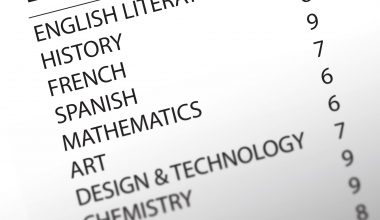When do you pick your GCSEs in Year 9? This is a question that often pops up as you progress through your school years in the UK. Well, the answer is, that you usually start making those important decisions in Year 9, when you’re around 13 to 14 years old.
Because it is a crucial moment in your education journey, the choices you make here can shape your future academic and career path. Hence, the serious thoughts and attention to understanding what each subject entails, the choosing process and taking part.
In this article, we’ll explore the ins and outs of this process, so you can make the best foundational choices for your future.
Table of contents
- Do Year 9 Do GCSE?
- When Do You Pick Your GCSEs in Year 9?
- When Do Students Choose Their Subjects in Year 9?
- How Many GCSE Subjects Can Students Choose in Year 9?
- What GCSE Grade Should You Be Getting in Year 9?
- Can You Choose Your GCSE Options in Year 8?
- Can You Change Your GCSE Options?
- FAQs on when do you pick your GCSEs in year 9
- Conclusion
- References
- Recommendations
Do Year 9 Do GCSE?
What is Year 9 and do Year 9 students do GCSEs? Year 9 is a crucial stage in the British education system, typically covering the ages of 13 to 14. During this year, students don’t start their official GCSE exams, but they do begin the process of selecting the subjects they’ll study for their GCSEs.
Year 9 serves as a transition year, where students are introduced to a broader range of subjects. They usually start their GCSE courses in Year 10, which is when the official GCSE examinations kick off.
However, Year 9 is pivotal because students make important decisions about which GCSE subjects they want to pursue. These choices can influence their future educational and career paths, so it’s essential to consider them carefully.
While you won’t be taking the official GCSE exams in Year 9, the decisions you make during this year are the first steps toward your GCSE journey.
Read: Minimum Age to Take GCSE: Can You Take Your GCSEs Early?
When Do You Pick Your GCSEs in Year 9?
In the United Kingdom, students typically pick their GCSE subjects in Year 9, which usually occurs around the age of 13 to 14. This marks a critical juncture in their educational journey.
During Year 9, students begin the process of selecting the specific subjects they’ll study for their General Certificate of Secondary Education (GCSE) qualifications. While the official GCSE exams take place in Year 11, the choices made in Year 9 play a pivotal role in shaping students’ academic and career paths.
The selection process involves considering personal interests, career aspirations, and academic strengths, often with the guidance of teachers and career advisors. Therefore, Year 9 is a crucial time for students to make informed decisions that will impact their educational future.
When Do Students Choose Their Subjects in Year 9?
Students typically choose their subjects in Year 9 in the United Kingdom. Year 9 corresponds to the ages of 13 to 14. During this academic year, students make decisions about which subjects they want to study for their General Certificate of Secondary Education (GCSE) qualifications.
This selection process is a crucial step in their educational journey because it determines the specific courses they will take in Year 10 and Year 11 when they officially begin their GCSE studies.
The choices made in Year 9 can significantly impact future educational and career opportunities. Therefore, students need to consider their interests, strengths, and long-term goals when making these selections, with guidance from teachers and career advisors.
Also, read: What Happens If You Fail Your GCSEs Twice?
How Many GCSE Subjects Can Students Choose in Year 9?
In Year 9 in the United Kingdom, students typically have the opportunity to choose a varying number of GCSE subjects, but the common range is between 8 to 10 subjects. However, the exact number can vary from school to school and even among individual students.
Some schools may allow students to choose more or fewer subjects based on their academic abilities, interests, and the school’s curriculum offerings.
It’s important to note that there are usually some compulsory subjects that all students must take, such as English Language, English Literature, Mathematics, and Science. These core subjects are usually non-negotiable, and students must study them alongside their chosen GCSE subjects.
The flexibility in the number of subjects students can choose allows them to tailor their education to their interests and future aspirations, whether that involves pursuing a wide range of subjects or focusing more intensely on a select few.
What GCSE Grade Should You Be Getting in Year 9?
In Year 9, students are typically expected to be making significant progress in their studies, and their anticipated GCSE grades reflect this progression. While individual schools and students may vary, a general guideline is that by Year 9, most pupils should be aiming to achieve a GCSE grade of 4 or 5 in their chosen subjects. Some highly capable students might even be targeting grades 6 or 7.
It’s important to remember that these are approximate expectations and can differ based on the student’s effort, aptitude, and the specific subject.
Additionally, achieving these grades in Year 9 sets a solid foundation for further studies, as GCSEs are typically taken in Year 11. Consistent effort and commitment to learning during Year 9 can greatly influence a student’s academic success in the future.
Read Also: How to Prepare For Your GCSEs in Year 11 | 2024 Complete Guide
Can You Choose Your GCSE Options in Year 8?
In the UK, the standard practice is to choose your GCSE options in Year 9, which is typically around the age of 13 to 14. Year 8 is primarily a preparatory year where students continue with their Key Stage 3 curriculum, gaining essential knowledge and skills.
The formal process of selecting GCSE subjects usually begins in Year 9 when students, with guidance from teachers and advisors, make informed choices based on their interests, strengths, and career aspirations.
While it’s uncommon to choose GCSEs in Year 8, some schools might offer early guidance or exploration activities to help students make more informed decisions in Year 9.
Can You Change Your GCSE Options?
When you pick your GCSEs in year 9, it is possible to change your GCSE options. However, it often depends on your school’s policies and the timing of the changes. Most schools understand that students’ interests and circumstances can evolve.
Typically, there’s a window of opportunity shortly after the initial selection process in Year 9 during which changes can be made. However, once coursework or exam preparations have begun for specific subjects, it may become more challenging to switch.
It’s essential to consult with your school’s academic counselors or administrators to understand the specific procedures, deadlines, and potential implications of changing your GCSE options to ensure a smooth transition and minimize disruption to your studies.
FAQs on when do you pick your GCSEs in year 9
In Year 9, students are expected to have progressed to a level where they are working towards achieving grades 4 to 5 in their subjects, with some high-achieving students aiming for grades 6 or 7.
In the UK, Year 9 students may have exams, but these are typically not the official GCSE exams. Year 9 exams are often used for assessing progress and readiness for the GCSE courses that start in Year 10 and culminate in official GCSE examinations in Year 11.
Yes, Year 9 is considered important in the UK because it’s the year when students select their GCSE subjects, setting the foundation for their future academic and career paths. Making informed choices in Year 9 is crucial.
Conclusion
Year 9 is a pivotal moment in the UK education system when students embark on their GCSE journey. Choosing the right subjects at this stage is essential, as it can shape their future academic and career pathways. It’s a time for careful consideration, guidance, and informed decisions to ensure a successful educational journey ahead.
References
- Thinstudent.co.uk – When Do You Choose Your GCSEs?
- Careerpilot.org.uk – Choosing your GCSEs
- Oxbridgehomelearning.uk – Which GCSEs should you take? A guide to choosing subjects






